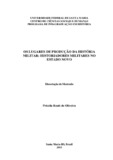| dc.creator | Oliveira, Priscila Roatt de | |
| dc.date.accessioned | 2016-03-30 | |
| dc.date.available | 2016-03-30 | |
| dc.date.issued | 2015-08-06 | |
| dc.identifier.citation | OLIVEIRA, Priscila Roatt de. THE PLACES OF MILITARY HISTORY PRODUCTION:
MILITARY HISTORIANS IN NEW STATE. 2015. 129 f. Dissertação (Mestrado em História) - Universidade Federal de Santa Maria, Santa Maria, 2015. | por |
| dc.identifier.uri | http://repositorio.ufsm.br/handle/1/9667 | |
| dc.description.abstract | The main problem of this work is to understand the political sense of the rememoration of the past inside the Brazillian Armed Forces and in which ways the historiographical production of this institution collaborated to create a form of speech that justifies its own political and social finality in the New State period. Furthermore, how these narratives about the past of the institution collaborated to create some sort of identity to the soldiers in this period. The present work analyze the historiography produced by a group of individuals, from the civil society or military that had connections with the Brazillian Armed Forces. This work used three sources of historiographical production: Biblioteca Militar (Military Library), A Defesa Nacional ( The National Defense magazine), Revista Nação Armada (Armed Nation Magazine), all of them having bonds to the army or/and having military writers with close relations with the Getúlio Vargas government. There was two themes highlighted in the military production: the biographical narratives and the anti-communism. This work discusses on how these biographical narratives transformed the heroes life into moral examples. The glorification of the hero as a form of identification of the Army in the New State period, but also the opposite: the traitor. This concept was associated to the communists, after the uprisings from the Aliança Nacional Libertadora (National Alliance of Liberation) in 1935. In the second part of this work, there is a discussion about the place that the Brazillian Armed Forces occupies in the nationality formation in the past, present and future of the nation, using the narratives from the Military Library and Military magazines. This work belongs to the Post-Graduation Program in History at the Santa Maria Federal University, in the Culture, Power and History research field, in the Society, Politics and Frontier line. It got a CAPES scholarship. | eng |
| dc.format | application/pdf | por |
| dc.language | por | por |
| dc.publisher | Universidade Federal de Santa Maria | por |
| dc.rights | Acesso Aberto | por |
| dc.subject | Historiografia | por |
| dc.subject | História dos conceitos | por |
| dc.subject | Exército | por |
| dc.subject | Estado Novo | por |
| dc.subject | Política | por |
| dc.subject | Historiography | eng |
| dc.subject | History of concepts | eng |
| dc.subject | Army | eng |
| dc.subject | New state | eng |
| dc.subject | Politics | eng |
| dc.title | Os lugares de produção da história militar: historiadores militares no Estado Novo | por |
| dc.title.alternative | The places of military history production: military historians in New State | eng |
| dc.type | Dissertação | por |
| dc.description.resumo | O presente trabalho tem como principal problemática compreender o sentido político da rememoração do passado no interior do Exército e de que forma a produção histórica da própria instituição contribuiu para a criação de um discurso que justificava a sua finalidade social ou política no Estado Novo. Ademais, Como tais narrativas sobre o passado da instituição colaboraram para a criação de uma identidade para os soldados nesse período. Este trabalho busca analisar a historiografia produzida por um grupo de indivíduos, civis ou militares, que estaria vinculado ao Exército por intermédio de alguma instituição, imprensa ou órgão direta ou indiretamente ligado as Forças Armadas. No caso desta pesquisa, três lugares de produção historiográfica foram selecionados: a Biblioteca Militar, a Revista A Defesa Nacional e a Revista Nação Armada , todas vinculadas ao Exército ou/e possuindo escritores militares, com relações estreitas com o governo de Getúlio Vargas. Dois temas destacaram-se na produção militar: as narrativas biográficas e o anticomunismo. Neste texto discorre-se sobre como essas narrativas biográficas transformavam as trajetórias dos heróis em exemplos morais. A exaltação do heróico como forma de identificação pelo Exército no Estado Novo, também possuía o seu oposto: o traidor. Conceito associado aos comunistas, depois dos levantes da Aliança Nacional Libertadora em 1935. Em um segundo momento, discorre-se sobre o lugar ocupado pelas Forças Armadas na formação da nacionalidade , no passado, no presente e no futuro da nação, a partir das narrativas históricas da Biblioteca Militar e nas Revistas Militares. O trabalho pertence ao Programa de Pós-graduação em História, da UFSM, que possui a área de concentração História, Poder e Cultura, fazendo parte da linha de pesquisa Fronteira, Política e Sociedade, obteve bolsa por intermédio do órgão financiador CAPES. | por |
| dc.contributor.advisor1 | Fertig, André Atila | |
| dc.contributor.advisor1Lattes | http://buscatextual.cnpq.br/buscatextual/visualizacv.do?id=K4790057U9 | por |
| dc.contributor.referee1 | Armani, Carlos Henrique | |
| dc.contributor.referee1Lattes | http://lattes.cnpq.br/3735821554238929 | por |
| dc.contributor.referee2 | Souza, Adriana Barreto de | |
| dc.contributor.referee2Lattes | http://lattes.cnpq.br/7574579937795901 | por |
| dc.creator.Lattes | http://lattes.cnpq.br/5820237623472322 | por |
| dc.publisher.country | BR | por |
| dc.publisher.department | História | por |
| dc.publisher.initials | UFSM | por |
| dc.publisher.program | Programa de Pós-Graduação em História | por |
| dc.subject.cnpq | CNPQ::CIENCIAS HUMANAS::HISTORIA | por |


